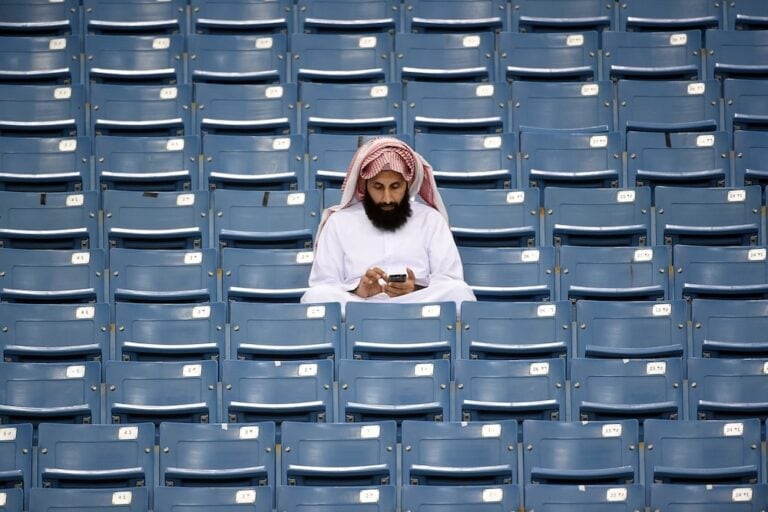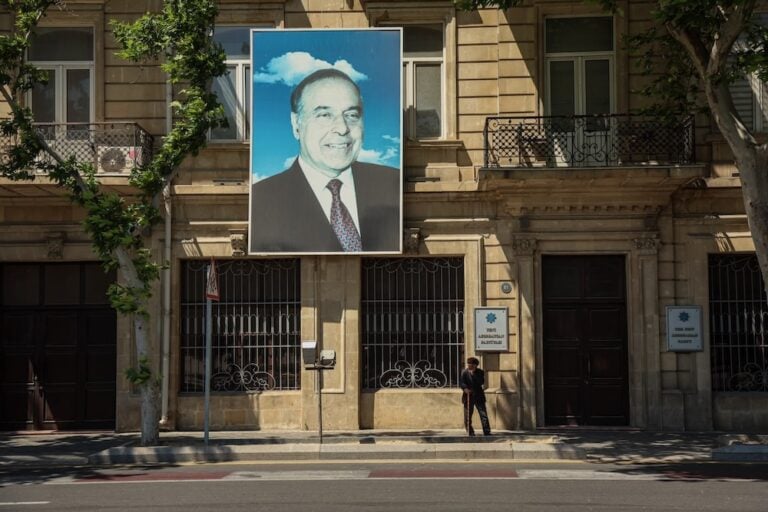UAE authorities should drop charges against five activists arrested after they called for democratic reforms, four international human rights organizations said today.
Abolish penal code censorship provisions, protect activists from harm
(ANHRI/Human Rights Watch/IFEX) – London, July 17, 2011 – UAE authorities should drop charges against five activists arrested after they called for democratic reforms, four international human rights organizations said today.
The call comes as the activists’ trial for “publicly insulting” the UAE president and other top officials re-opens on 18 July in Abu Dhabi’s Federal Supreme Court, against the backdrop of a wider clampdown on dissent in the UAE.
The four rights groups – Amnesty International, the Arabic Network For Human Rights Information (ANHRI), Front Line Defenders and Human Rights Watch – jointly called on the UAE authorities to abandon the trial and release the men immediately.
In the UAE, the penal code allows the government to jail people simply for expressing their peaceful views, in contravention of clear international human rights guarantees of free speech.
“The UAE government is using defamation as a pretext to prosecute activists for peacefully expressing their beliefs about the way their country should be run,” said Philip Luther, Amnesty International’s Middle East and North Africa Deputy Director. “We consider all five men prisoners of conscience and call on the UAE authorities to release them unconditionally.”
The five men have been detained since April, when the UAE Attorney General announced that they were in “preventive custody” for “instigation, breaking laws and perpetrating acts that pose a threat to state security, undermining the public order, opposing the government system, and insulting the president, the vice president and the crown prince of Abu Dhabi.”
In early June, the five men were charged under article 176 of the Penal Code, which makes it a crime to publicly insult the country’s top officials. Two of the men, blogger Ahmed Mansoor and lecturer Nasser bin Ghaith, are accused of having used the online political forum UAE Hewar to “conspire against the safety and security of the State in association with foreign powers”. The rights groups said that the government has presented no legitimate evidence to support this assertion.
The human rights organizations have found no evidence that the men had used or incited violence in the course of their political activities.
Mansoor faces additional charges for inciting others to break the law, and calling for an election boycott and for demonstrations.
In March, shortly before his arrest, he vocally supported a petition signed by more than 130 people that called on the UAE president to introduce universal, direct elections for the Federal National Council and to give the body legislative powers.
“In this day and age, with all that is going on in the region, it is disturbing and absurd that the UAE is prosecuting activists simply because they spoke out for democracy,” said Sarah Leah Whitson, Middle East director at Human Rights Watch. “The international community should end its silence and condemn this mockery of justice; the government had no business arresting these men in the first place.”
Since their arrests, the activists – particularly Mansoor – have been the subject of an intimidating online and satellite television campaign accusing them of being religious extremists and foreign agents, who want to cause harm to the UAE.
When the activists complained to the police of similar threats before their arrests, the authorities said they could not take action against websites registered outside the country.
“These men should be able to expect that the authorities are there to protect them for threats and attacks,” said Andrew Anderson, Deputy Director of Front Line Defenders. “Instead we have seen the campaign against them intensify without any sign of action by the UAE government.”
As part of a wider clampdown on freedom of expression, the government also disbanded the elected boards of the Jurists Association and the Teachers’ Association after they and two other organizations called for political reforms in April.
The rights groups called for the government to rescind the decision and reinstate the former boards of these organizations.
“The UAE serves neither its citizens nor its international reputation by seeking to prevent legitimate debate taking place,” said Rawda Ahmed, deputy executive director of ANHRI. “Rather than try to silence calls for reform, the UAE government would do well to heed them.”
BACKGROUND:
The five activists, whose trial opened on 14 June, are: Ahmed Mansoor, an engineer and blogger who is also a member of Human Rights Watch’s Middle East advisory committee and a member of ANHRI’s network; Nasser bin Ghaith, an economist, university lecturer and advocate of political reform; and Fahad Salim Dalk, Ahmed Abdul Khaleq and Hassan Ali al-Khamis, all online activists.
Article 176 of the penal code permits a sentence of up to five years in prison for “whoever publicly insults the State President, its flag or national emblem.” Article 8 of the code widens the application of the provision to include the vice president, members of the Supreme Council of the Federation, and others.
Freedom of speech is guaranteed under the UAE’s constitution and is well established under international human rights law. The International Covenant on Civil and Political Rights (ICCPR) holds that “everyone shall have the right to freedom of expression…to seek, receive and impart information and ideas of all kinds.” While the UAE is not a party to the ICCPR, it constitutes an authoritative source and guideline reflecting international best practice. Accepted international standards only allow content-based restrictions in extremely narrow circumstances, such as cases of slander or libel against private individuals or speech that threatens national security.
Article 32 of the Arab Charter on Human Rights, which has been ratified by the UAE, guarantees the right to freedom of opinion and expression, and to impart news to others by any means. The only restrictions allowed on the practice of this right are those imposed for “respect for the rights of others, their reputation, or the protection of national security, public order, public health, or public morals.”
The United Nations Declaration on Human Rights Defenders provides that countries should “take all necessary measures to ensure the protection of everyone against any violence, threats, retaliation, adverse discrimination, pressure or any other arbitrary action” as a result of their participation in human rights activity.
To watch a video about the case made by Amnesty International, click here.
For more information please call:
– Amnesty International’s press office in London on:
+44 20 7413 5566 or james.lynch (@) amnesty.org
– Human Rights Watch press office in New York on:
+1 212-612-1832 or muscats (@) hrw.org
– Arabic Network for Human Rights Information press office in Cairo:
+20223964058 or rawdaahmed (@) anhri.net
– Front Line Defenders in Dublin, the press office:
+353 1 212 3750 or jim (@) frontlinedefenders.org
Amnesty International
Front Line Defenders



